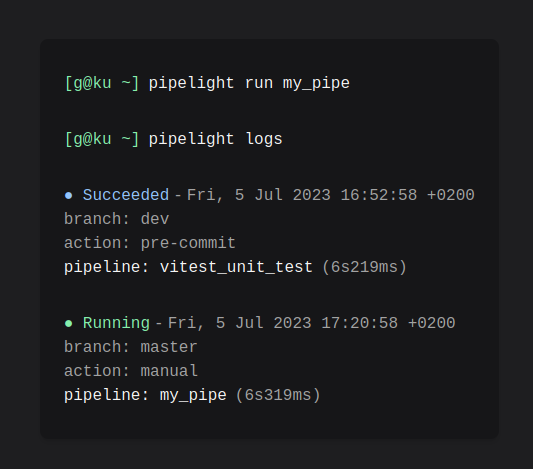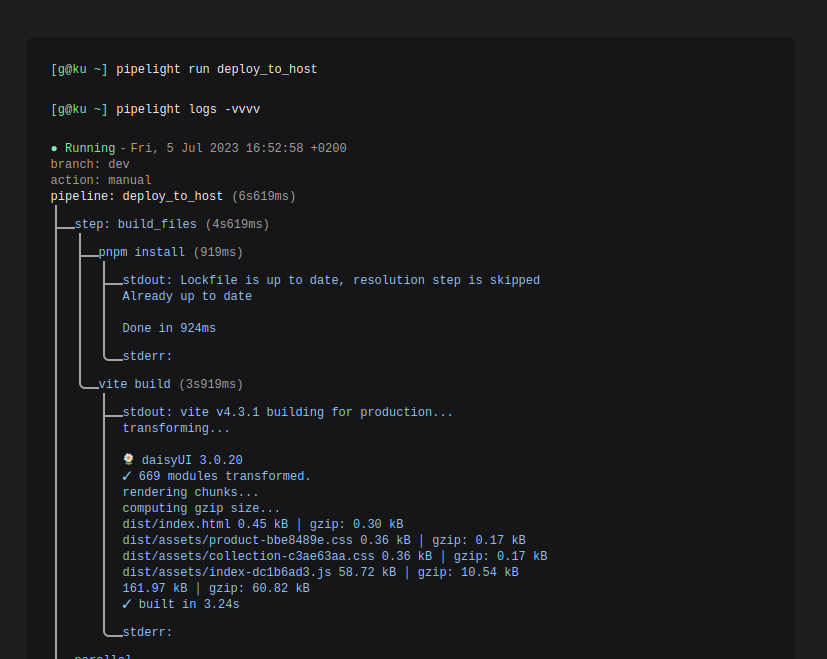Automate your most boring and repetitive tasks.
Pipelight is a Rust based small(13Mb) cli tool to be used from inside a terminal.
- Define pipelines using toml, hcl, yaml, typescript.
- Trigger on events: git hooks, file changes...
Checkout the Documentation for a much friendly approach and a deeper understanding.
Fold your bash commands into an object Pipeline{ Step{ Command }}.
Use your preferred configuration languages for your most simple pipelines.
-
Toml
[[pipelines]] name = "test" [[pipelines.steps]] name = "build" commands = ["pnpm install", "pnpm build"] [[pipelines.triggers]] branches = ["master","dev"] actions= ["pre-push", "pre-commit"]
-
Hcl
# A pipeline pipelines = [{ name = "test" steps = [{ name = "build" commands = ["pnpm install", "pnpm build"] }] triggers = [{ branches = ["master","dev"] actions = ["pre-push", "pre-commit"] }] }]
-
Yaml
pipelines: - name: test steps: - name: build commands: - pnpm install - pnpm build - triggers: - branches: - master - dev actions: - pre-push - pre-commit
Fold your bash commands into an object Pipeline{ Step{ Command }}.
As long as you know javascript, you are ready to go with your favorite syntax flavor.
-
Javascript. Use a verbose and declarative syntax.
const my_pipeline = { name: "build_my_website", steps: [ { name: "clean directory", commands: ["rm -rf ./dist"], }, { name: "build", commands: ["pnpm install", "pnpm lint", "pnpm build"], }, ], };
-
Typescript(with Helpers). Use the provided sweet shorthands.
const my_pipeline = pipeline("build website", () => [ step("clean directory", () => [`rm -rf ${build_dir}`]), step("build", () => ["pnpm install", "pnpm lint", "pnpm build"]), step("send to host", () => [`scp -r ${build_dir}`]), step("do stuffs on host", () => [ ssh("host", () => ["systemctl restart nginx"]), ]), ]);
Add automatic triggers to your pipeline.
If you want to run tests on file change or deploy to production on push to master.
# enable watcher and git hooks.
pipelight enable git-hooks
pipelight enable watcher[[pipelines.triggers]]
branches = ["master"]
actions = ["pre-push"]Get the pipeline most relevant informations or dive into the steps and commands standard outputs.
Get the pipeline status, event, execution time... and more.
pipelight logsGet a tranparent outputs of every subprocesses.
pipelight logs -vvvvCheckout the instruction guide for your favorite package manager.
Create a default configuration file pipelight.ts in your project root
directory with:
pipelight initTry the harmless default pipeline:
pipelight runAnd explore logs:
pipelight logs -vvvvReach the community whenever you need support or software improvements. On discord or on telegram at @Areskul or send a mail at areskul@areskul.com.
Licensed under GNU GPLv2 Copyright (C) 2023 Areskul



